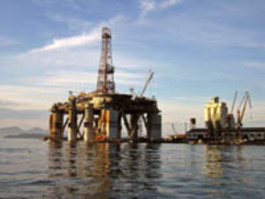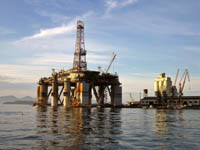Look, I’m not an oil company executive or engineer, OK?

 Look, I’m not an oil company executive or engineer, OK? But three weeks into the on-going BP oil well blowout fiasco (or crisis, if you prefer) in the Gulf of Mexico, does it trouble you at all that nobody seems to know for sure what we’re supposed to be doing next? With over 4 million gallons of crude oil already spewed into the Gulf since the well blowout on April 20, what if the leak (at a rate federal officials now estimate to be 210,000 gallons/day) can’t be capped? I.e., what if a million gallons of crude a week keep gushing out of the broken well head into the Gulf of Mexico and eventually the oceans beyond?
Look, I’m not an oil company executive or engineer, OK? But three weeks into the on-going BP oil well blowout fiasco (or crisis, if you prefer) in the Gulf of Mexico, does it trouble you at all that nobody seems to know for sure what we’re supposed to be doing next? With over 4 million gallons of crude oil already spewed into the Gulf since the well blowout on April 20, what if the leak (at a rate federal officials now estimate to be 210,000 gallons/day) can’t be capped? I.e., what if a million gallons of crude a week keep gushing out of the broken well head into the Gulf of Mexico and eventually the oceans beyond?
I hadn’t even contemplated such a disastrous “worst case scenario” until two friends put me in touch with the Pure Energy Systems Network website (www.pesn.com) that carries the reflective analysis of software engineer and oil industry analyst Paul Noel. Noel observes that while BP officials are not commenting, the oil and natural gas deposit they were drilling into when the fatal blowout occurred may be either the largest or second largest such deposit in the world—easily topping 500,000 barrels of production a day for ten to fifteen years! The deposit covers up to 25,000 square miles and lies thirty thousand feet into the earth’s crust beneath the five-thousand-foot deep floor of the Gulf of Mexico. (You get the picture—it’s huge!) Drilling for that “deep oil,” BP punched a hole into this super-charged high-pressure (70,000 psi) pocket, and the rest is the unfolding story of a potential crisis, the magnitude of which nobody yet dares to predict. What if in all the efforts to plug the leak/hole, a much larger hole is blown open? What then? “Stunning dangerous” is how Noel described it. Another panicked writer bluntly predicted, “We are seeing a major historical and economic event taking place that could change the world as we have known it.”
What’s that have to do with you and me? Simple. The unfolding saga in the Gulf is an apocalyptic-like reminder that whether it be a volcano or an earthquake or hurricane (all acts of nature), or whether it be a BP-like disaster or a Greece-like economic meltdown (all acts of man), life on this terrestrial ball can suddenly, literally over-night be irrevocably changed.
Which is why the call to collective prayer sounded in today’s story (“The Santayana Factor—Tales of the Kings”—II) is so earnestly essential. In five weeks leaders and delegates from my own community of faith will gather in Atlanta, Georgia, for a week of prayerful deliberations. Shall it be once again business as usual? Or should the hearts of God’s people be stirred to their depths with the compelling sense of our utter need for his intervention at this critical time in earth’s history? I believe it is the latter that must awaken us to corporate prayer as never before. As the narrative of this ancient king reminds us, it is the moral duty of spiritual leaders to call the people of God to prayer. Then shall we not unite in this common prayer? “‘O our God—we do not know what to do, but our eyes are upon you’” (II Chronicles 20:12).